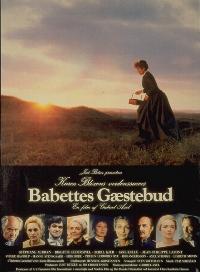
This weeks' New York Times Critic's Pick video review is Babette's Feast.
You can watch the NYT review by A.O.Scott here.
Babette's feast was written by Isak Dinesen, and made into a 1987 film by Danish Director Gabriel Axel. The three main characters are women. Two, elderly spinster sisters, are running a small protestant community in a remote and barren land. The community was started by their father, now deceased, and practices an austere form of the religion. They are pious and strict, yet the community is not at peace - there are frictions, making it seem very unlike the ideal state presented in the Acts of the Apostles. The sisters do not live their own lives. They live out their father's will - all is about duty, and their own loves, desires, passions and even God given gifts are sacrificed at the altar of duty.
Into this world or order, blandness and predictability comes the third woman, a French woman, fleeing war. She is very unlike them. She brings about spirituality via the creation of beauty in cuisine, and draws out the nuances and varieties from what we typically think of as being a single, monolithic appetite.
For a while, as Babette prepares her meal of thanksgiving, the sisters look with horror at her work and believe it will bring evil and harm to the community. In this, they are sincere but so wrong. Before partaking of the meal, the members of the community, all elderly, conspire to taste the food, but refuse to enjoy it.
At the end of the meal, their guest, an elderly General who has tasted the good life and seen the world, but carried an emptiness in his heart (for he was the unsuccessful suitor of one of the sisters) finds himself astounded and spiritually moved by the magnificent meal in the austere setting (a setting that to him had represented the end of love and hope in his life).
While watching the film, one thinks of how before fully understanding, Francis of Assissi not only denied his appetites, but also mistreated his body, seeing it as the source of his appetites. Towards his end, he began to recognise that his body was a gift, one he should have taken better care of and better respected - perhaps at this time, he also began to realise that all appetites are good - none should ever be over indulged, but neither should any be denied.
A few other thoughts that come from watching, are about how the main characters are all women, how Babette does not speak the language nor attempts to change the mindset of the community that is giving her refuge. In providing them the feast, she is trying to thank them in the most sincere way she knows how. In her sacrifice of all her wealth, and the food and drink, there is an aspect of the Last Supper hovering in the shadows, just out of sight but with a presence one can feel over the marvel and color of the glorious food.
This film is truly food for thought. (Just couldn't resist - my apologies).
I got to watch it many years ago, and it still haunts me. There's another film where food plays a very central role, and that is just the opposite - it's very surreal, but equally enjoyable (in a perverse way) - I'll write about Tampopo another day.
No comments:
Post a Comment